|
The Civil war is another catastrophe for Greece, for many worse than the Nazi occupation. More people are killed during the Civil war than during the occupation. Greece is the first battle of the Cold War.
|
|
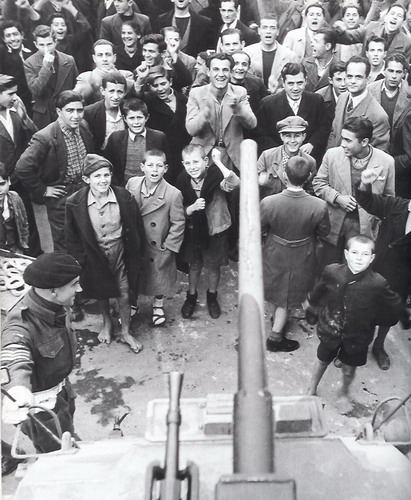 In 1944 Greece is liberated from the German occupation though the celebration is a short one. The victorious resistance fighters of the left and the right have already
begun to
fight each other. With the King,
the government and the army still in Egypt, and the collapse of the occupation government, it is the Greek communists who control most of the country. Even before the Germans had left the communist led resistance controlled all but the cities. But it has already been decided by Stalin and Churchill that Britain will be in charge of a non-communist Greece in return for Romania, Bulgaria and Hungary falling under the influence of the Soviet Union. This is known as Percentages
Agreement. The usual interpretation is that the main reason that Churchill wanted to keep the Soviets out of Greece was the eternal British preoccupation with keeping the Russians out of the Dardenelles Straits and Greece so as to deny their Navy unfettered access to the Mediterranean. The British also know that their business interests in Greece have no future if the communists are able to take over. The forces of ELAS (The Greek-communist resistance) could
have easily
taken the city
of Athens but instead obey the orders of the British and the promise that they will have a part in the post-war government of Greece, perhaps believing that the small British force in Athens was just the tip of the iceberg with more troops waiting in the wings. When George Papandreou returns to Greece with his government he is in a difficult position. On one side is EAM who have been preparing through the years of occupation for the day that they would take power in Greece. On the other side is the
British who to protect their own interests will back the king, the collaborators and the security battalions because they are anti-communist. Papandreou had foreseen that the communists would be in a strong position to take over the country once the Germans had left and had asked Churchill to send a large force to Greece. Churchill said he did not have the forces to spare so Papandreou did the next best thing. He got them to agree that King George would not return to Greece until after a plebiscite. At least
this
would keep the Royalists and the Republicans unified against the communists instead of fighting each other. In 1944 Greece is liberated from the German occupation though the celebration is a short one. The victorious resistance fighters of the left and the right have already
begun to
fight each other. With the King,
the government and the army still in Egypt, and the collapse of the occupation government, it is the Greek communists who control most of the country. Even before the Germans had left the communist led resistance controlled all but the cities. But it has already been decided by Stalin and Churchill that Britain will be in charge of a non-communist Greece in return for Romania, Bulgaria and Hungary falling under the influence of the Soviet Union. This is known as Percentages
Agreement. The usual interpretation is that the main reason that Churchill wanted to keep the Soviets out of Greece was the eternal British preoccupation with keeping the Russians out of the Dardenelles Straits and Greece so as to deny their Navy unfettered access to the Mediterranean. The British also know that their business interests in Greece have no future if the communists are able to take over. The forces of ELAS (The Greek-communist resistance) could
have easily
taken the city
of Athens but instead obey the orders of the British and the promise that they will have a part in the post-war government of Greece, perhaps believing that the small British force in Athens was just the tip of the iceberg with more troops waiting in the wings. When George Papandreou returns to Greece with his government he is in a difficult position. On one side is EAM who have been preparing through the years of occupation for the day that they would take power in Greece. On the other side is the
British who to protect their own interests will back the king, the collaborators and the security battalions because they are anti-communist. Papandreou had foreseen that the communists would be in a strong position to take over the country once the Germans had left and had asked Churchill to send a large force to Greece. Churchill said he did not have the forces to spare so Papandreou did the next best thing. He got them to agree that King George would not return to Greece until after a plebiscite. At least
this
would keep the Royalists and the Republicans unified against the communists instead of fighting each other.
|
|
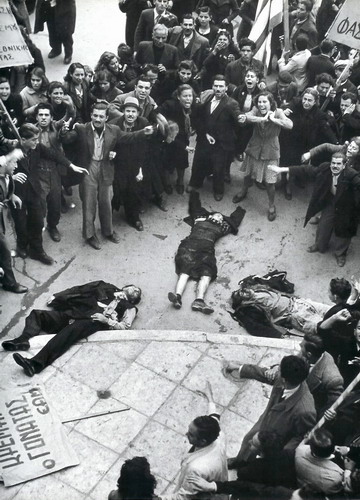 In the meantime in England, Winston Churchill informs British foreign secretary Anthony Eden that he is planning to create a confrontation between the new Greek government and the former
resistance
fighters of EAM-ELAS. He tells Eden
that he will use the British military, already in Athens, to defend Papandreou's government. Papandreou orders the 60,000
members of the resistance to disarm if they want to continue to take part in the government. The communists agree provided that all Nazi collaborators are removed from positions of power and the members of the ultra-right security battalions who have been terrorizing the left are disarmed or arrested. The British are now focused on the communist threat and have no desire to disarm these groups, choosing now to form an alliance with the extremist forces of the collaborators. With the country so polarized Papandreou
as a moderate is in an impossible situation. He can't carry out the programs of the British-backed extreme right nor can he join the communist who seem to be heading for open revolt. When the EAM ministers resign from the government a protest rally is staged by their supporters in Syntagma Square followed by a general strike. The British ambassador demands the government to not allow the Greek people to express their views through this protest (as they are entitled to in any true democracy)
and the government agrees to break up the rally, by force if they have to. Whether by accident or by plan the police open fire on the demonstrators, killing several. This sets off battles all over Athens as ELAS units attack police stations to get weapons and ammunition. The riots of December 3rd 1944 and the six weeks of fighting which follow are known as the Dekembriana. The Greek fighters who have just finished a war with the Germans are now at
war with the British troops in Athens and the right-wing security battalions all over Greece. During this battle the British control a small area around Syntagma Square and their headquarters in the Grande Bretagne Hotel, while the forces of ELAS control almost all of Athens with the exception of Kolonaki. British paratroopers are stationed on the Acropolis where they have a view of most of the city. In the meantime in England, Winston Churchill informs British foreign secretary Anthony Eden that he is planning to create a confrontation between the new Greek government and the former
resistance
fighters of EAM-ELAS. He tells Eden
that he will use the British military, already in Athens, to defend Papandreou's government. Papandreou orders the 60,000
members of the resistance to disarm if they want to continue to take part in the government. The communists agree provided that all Nazi collaborators are removed from positions of power and the members of the ultra-right security battalions who have been terrorizing the left are disarmed or arrested. The British are now focused on the communist threat and have no desire to disarm these groups, choosing now to form an alliance with the extremist forces of the collaborators. With the country so polarized Papandreou
as a moderate is in an impossible situation. He can't carry out the programs of the British-backed extreme right nor can he join the communist who seem to be heading for open revolt. When the EAM ministers resign from the government a protest rally is staged by their supporters in Syntagma Square followed by a general strike. The British ambassador demands the government to not allow the Greek people to express their views through this protest (as they are entitled to in any true democracy)
and the government agrees to break up the rally, by force if they have to. Whether by accident or by plan the police open fire on the demonstrators, killing several. This sets off battles all over Athens as ELAS units attack police stations to get weapons and ammunition. The riots of December 3rd 1944 and the six weeks of fighting which follow are known as the Dekembriana. The Greek fighters who have just finished a war with the Germans are now at
war with the British troops in Athens and the right-wing security battalions all over Greece. During this battle the British control a small area around Syntagma Square and their headquarters in the Grande Bretagne Hotel, while the forces of ELAS control almost all of Athens with the exception of Kolonaki. British paratroopers are stationed on the Acropolis where they have a view of most of the city.
|
|
 On Christmas day of 1944, Winston Churchill arrives in Athens along with Anthony Eden. Papandreou is replaced by an old Venizelist, General Plastiras, and
King George
is convinced to delay his return
to Greece and allow the role of regent to be filled by Archbishop Damaskinos. Churchill had previously described Damaskinos as a 'pestilent priest' and a 'survivor of the middle ages' but he leaves Greece with a new respect for the religious leader of Athens and he has also brokered a cease-fire between ELAS and British forces. In 1945 the government and the communists sign the Varkiza Agreement which is to disarm the ELAS resistance fighters as well as the Nazi collaborators and members of
the far right who have been attacking the communists in retribution for attacks against them during the occupation. As trials begin for members of ELAS and the collaborators begin, an odd pattern takes form. Communists are given the death sentence while Nazi collaborators are let off lightly. In the British House of Commons this sets off a debate and the trials are stopped, but the persecution of the members of ELAS continues. The government of Prime Minister Plastiras has no power over the British
supported right-wing para-government, a-state-within-a-state. In the trials of the leaders of the Nazi collaborators three members of the puppet government are sentenced to death including Prime Minister Rallis who had ordered the execution of fifty Greek hostages as a reprisal for the execution of a Nazi collaborator. None of these death sentences are carried out. On Christmas day of 1944, Winston Churchill arrives in Athens along with Anthony Eden. Papandreou is replaced by an old Venizelist, General Plastiras, and
King George
is convinced to delay his return
to Greece and allow the role of regent to be filled by Archbishop Damaskinos. Churchill had previously described Damaskinos as a 'pestilent priest' and a 'survivor of the middle ages' but he leaves Greece with a new respect for the religious leader of Athens and he has also brokered a cease-fire between ELAS and British forces. In 1945 the government and the communists sign the Varkiza Agreement which is to disarm the ELAS resistance fighters as well as the Nazi collaborators and members of
the far right who have been attacking the communists in retribution for attacks against them during the occupation. As trials begin for members of ELAS and the collaborators begin, an odd pattern takes form. Communists are given the death sentence while Nazi collaborators are let off lightly. In the British House of Commons this sets off a debate and the trials are stopped, but the persecution of the members of ELAS continues. The government of Prime Minister Plastiras has no power over the British
supported right-wing para-government, a-state-within-a-state. In the trials of the leaders of the Nazi collaborators three members of the puppet government are sentenced to death including Prime Minister Rallis who had ordered the execution of fifty Greek hostages as a reprisal for the execution of a Nazi collaborator. None of these death sentences are carried out.
|
|
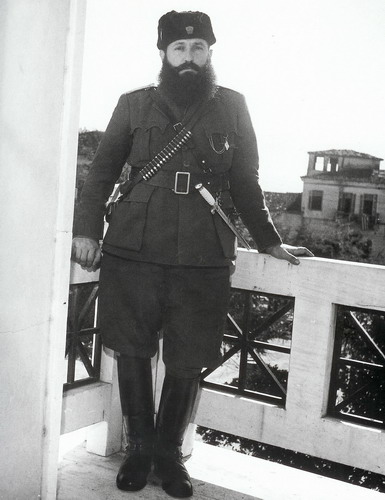 Aris Velouchiotis, the hero of the resistance,
believes
that taking part in the new government is capitulation
and the only way to achieve the communist goal is through armed struggle. He takes off for the hills with a small group of followers where he is killed (or some say commits suicide) after being surrounded by the National Guard. He had been denounced as a traitor by the Greek Communist Party (KKE) politburo the day before. In December of 1945 members of the KKE meet with various Bulgarian and Yugoslavian officers who assure them that they can use Albania, Bulgaria, and
Yugoslavia as bases in the event of a full-scale war. When the government does not honor the agreement to rid the country of fascists collaborators who continue to attack the left, the communists abstain from the elections. They attack a police station in Litohoro, Pieria. The Civil war has begun. In January of 1946 three thousand members of General Grivas rightwing terrorist organization known as X attacked the town of Kalamata, freeing imprisoned collaborators who were waiting to go to trial, burning
files and attempt to take over the building where the communists were being held. Failing this they kill 14 unarmed citizens and escape with 150 hostages. After executing some of the hostages they attack towns in Laconia and killed the relatives of known communists. Aris Velouchiotis, the hero of the resistance,
believes
that taking part in the new government is capitulation
and the only way to achieve the communist goal is through armed struggle. He takes off for the hills with a small group of followers where he is killed (or some say commits suicide) after being surrounded by the National Guard. He had been denounced as a traitor by the Greek Communist Party (KKE) politburo the day before. In December of 1945 members of the KKE meet with various Bulgarian and Yugoslavian officers who assure them that they can use Albania, Bulgaria, and
Yugoslavia as bases in the event of a full-scale war. When the government does not honor the agreement to rid the country of fascists collaborators who continue to attack the left, the communists abstain from the elections. They attack a police station in Litohoro, Pieria. The Civil war has begun. In January of 1946 three thousand members of General Grivas rightwing terrorist organization known as X attacked the town of Kalamata, freeing imprisoned collaborators who were waiting to go to trial, burning
files and attempt to take over the building where the communists were being held. Failing this they kill 14 unarmed citizens and escape with 150 hostages. After executing some of the hostages they attack towns in Laconia and killed the relatives of known communists.
|
|
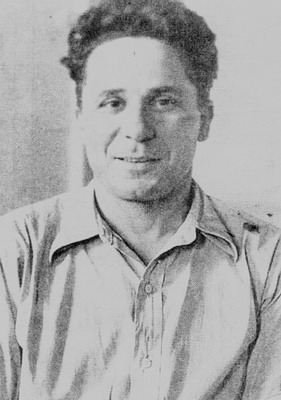 The government is powerless or unwilling to take action and the communist party of Greece publicly tells its members to take matters into their own hands, a call to war. In the United Nations,
Soviet Ambassador
Vishinsky details attacks
on Greek citizens by the British backed security battalions which British Foreign minister declares propaganda, claiming that upcoming elections in March would be free and honest. But with the countryside a battleground of murders and reprisals the communists want the elections postponed at least until order can be restored. The British tell the Greeks that the elections can't be postponed because the allied mission of election observers can't stay longer. Prime Minister Sophoulis declares that the elections
will be held with or without the communists but privately urges them to participate. With the left voting in the elections the possibility of a centrist government to oppose the right and limit their power, was possible. Nikos Zakhariades, leader of the KKE, who had spent the entire Second World War in Dachau, considers the advice
of his counterpart in the Italian Communist party who
also urges him to take part in the elections to avoid Greece being totally dominated by the right. To the glee of the right, Zakhariades decides the communists will not take part in the election. The opponents of the far right have been split. The government is powerless or unwilling to take action and the communist party of Greece publicly tells its members to take matters into their own hands, a call to war. In the United Nations,
Soviet Ambassador
Vishinsky details attacks
on Greek citizens by the British backed security battalions which British Foreign minister declares propaganda, claiming that upcoming elections in March would be free and honest. But with the countryside a battleground of murders and reprisals the communists want the elections postponed at least until order can be restored. The British tell the Greeks that the elections can't be postponed because the allied mission of election observers can't stay longer. Prime Minister Sophoulis declares that the elections
will be held with or without the communists but privately urges them to participate. With the left voting in the elections the possibility of a centrist government to oppose the right and limit their power, was possible. Nikos Zakhariades, leader of the KKE, who had spent the entire Second World War in Dachau, considers the advice
of his counterpart in the Italian Communist party who
also urges him to take part in the elections to avoid Greece being totally dominated by the right. To the glee of the right, Zakhariades decides the communists will not take part in the election. The opponents of the far right have been split.
The British government pressures the Greeks to hold the elections as planned though they know the results will rip the country apart. Fourteen of the thirty-five ministers in the Greek government are against the elections, nine of whom resign. But it is not only the British at fault for this rush to a marred democracy. The United States made it clear to Prime Minister Sophoulis that it was in Greece's best interest not to postpone the elections. So despite
knowing
that disaster
was around the next corner, the Greek government declared that since not even a two month postponement would be permitted by the UK and the US, elections would go on as planned.
|
|
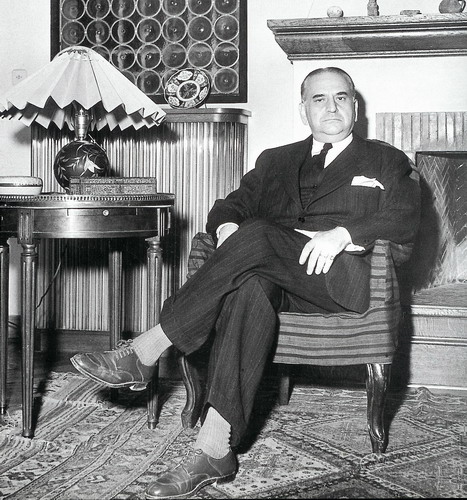 In the first free elections in 10 years only half the eligible voters of Greece actually vote. The two right-wing parties get a majority of these votes. The foreign observers low-ball the abstentions
to give the election validity and claim the elections fair since they had observed no violence or voter intimidation. But who was there
to intimidate if the left did not participate? A right-wing coalition dominated by the new People's Party is elected and their leader Constantinos Tsaldaris in
the opening session of parliament calls for the return of the king and initiates a constitutional plebiscite. When members of Britain's labor party come to Athens they report on well-armed bands attacking the left and the liberals, and daily political assassinations. The new right wing government is using the power of the state against anyone who is opposed to them. Laws are passed that result in the dismissal from government jobs and jobs in the private sector of anyone with democratic or leftist leanings.
At this point it is not only the communists who are heading for the mountains but terrified citizens. Once again in yet another rigged election 68% vote for the return of the king, some of whom may have seen Greece's return to a monarchy as being better then being run by the communists. King George arrives in Greece on September 27 1946 at about the same time as the British Parliamentary delegation is writing their report on the situation, calling it hopeless. In the first free elections in 10 years only half the eligible voters of Greece actually vote. The two right-wing parties get a majority of these votes. The foreign observers low-ball the abstentions
to give the election validity and claim the elections fair since they had observed no violence or voter intimidation. But who was there
to intimidate if the left did not participate? A right-wing coalition dominated by the new People's Party is elected and their leader Constantinos Tsaldaris in
the opening session of parliament calls for the return of the king and initiates a constitutional plebiscite. When members of Britain's labor party come to Athens they report on well-armed bands attacking the left and the liberals, and daily political assassinations. The new right wing government is using the power of the state against anyone who is opposed to them. Laws are passed that result in the dismissal from government jobs and jobs in the private sector of anyone with democratic or leftist leanings.
At this point it is not only the communists who are heading for the mountains but terrified citizens. Once again in yet another rigged election 68% vote for the return of the king, some of whom may have seen Greece's return to a monarchy as being better then being run by the communists. King George arrives in Greece on September 27 1946 at about the same time as the British Parliamentary delegation is writing their report on the situation, calling it hopeless.
|
|
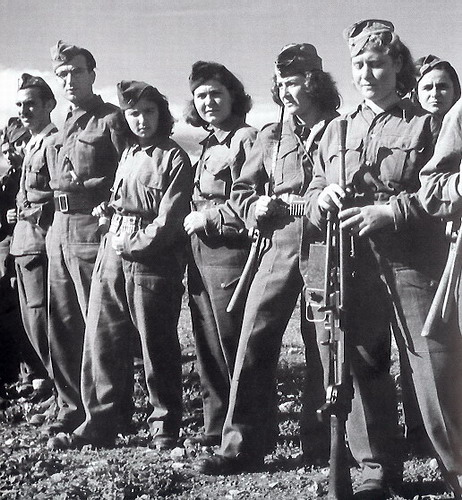 While the Tsaldaris government in Athens relies on the right-wing security battalions to fight ELAS sympathizers in the city's streets, the communists announce the formation of
a new Democratic
Army or DAG (Demokratikos Stratos Elladas) under the leadership of former ELAS leader Markos Vafiades, and begin to wage war on the government. By the end of 1946, he has 7,000 combatants. By early 1947, the Democratic army controls perhaps 100 Greek villages. Their first battles are against right-wing bands and the establishment of 'free territories' in the mountains of northern Greece where 'People's Tribunals' try and execute
'monarchofascist traitors'.
They also begin to collect taxes from held villages, conscript peasants as labor or fighters and force them to donate food, livestock and other necessities to the Democratic Army of Greece. The ranks of the DAG are swollen by enforced recruitment and villages that refuse to cooperate suffer severe reprisals. There are also secret Communist units carrying out assassinations and terrorism in the cities. In 1947 the communist party is outlawed in Greece. Napoleon Zervas, founder of EDES (National Republican
Greek League) becomes the minister for public order and promptly arrests some 3,000 Communists
and
condemned a number to death. That
same year, the British, losing influence in the Middle East and realizing that they have made a mess of things in Greece, announce they no longer are able to support the government they have put in power. They step aside to let the Americans take over. President Truman pours money, weapons and military advisors into the country to support the right wing-royalist Greek government against the communists. Greece is the first battle of what comes to be known as The Cold War. His speech to the US congress asking for money to fight communism worldwide, but particularly in Greece, becomes known as The Truman Doctrine. While the Tsaldaris government in Athens relies on the right-wing security battalions to fight ELAS sympathizers in the city's streets, the communists announce the formation of
a new Democratic
Army or DAG (Demokratikos Stratos Elladas) under the leadership of former ELAS leader Markos Vafiades, and begin to wage war on the government. By the end of 1946, he has 7,000 combatants. By early 1947, the Democratic army controls perhaps 100 Greek villages. Their first battles are against right-wing bands and the establishment of 'free territories' in the mountains of northern Greece where 'People's Tribunals' try and execute
'monarchofascist traitors'.
They also begin to collect taxes from held villages, conscript peasants as labor or fighters and force them to donate food, livestock and other necessities to the Democratic Army of Greece. The ranks of the DAG are swollen by enforced recruitment and villages that refuse to cooperate suffer severe reprisals. There are also secret Communist units carrying out assassinations and terrorism in the cities. In 1947 the communist party is outlawed in Greece. Napoleon Zervas, founder of EDES (National Republican
Greek League) becomes the minister for public order and promptly arrests some 3,000 Communists
and
condemned a number to death. That
same year, the British, losing influence in the Middle East and realizing that they have made a mess of things in Greece, announce they no longer are able to support the government they have put in power. They step aside to let the Americans take over. President Truman pours money, weapons and military advisors into the country to support the right wing-royalist Greek government against the communists. Greece is the first battle of what comes to be known as The Cold War. His speech to the US congress asking for money to fight communism worldwide, but particularly in Greece, becomes known as The Truman Doctrine.
|
|
 America joining the fray is vindication of a sorts for Winston Churchill. President Roosevelt believed Great Britain's policies in Greece were a mistake and that people
had the right to work out their problems democratically without influence from the outside. Had
Roosevelt been in control instead of Churchill one might argue that the war and the years that followed would have been completely different. In fact if left to work this out for themselves without the intervention and manipulations of the British the next twenty or thirty years in Greece might have been quite pleasant. As it turns out they could not have been any worse. America's attempt to clean up the mess the British have made, combined with their zeal for stamping out communism caused them to make matters
worse rather then get the two sides to the table and force them to work things out. Despite controlling the countryside, the communists did not have more than 25% support of the country. They might have been part of coalitions but were the democratic process allowed to go forth, without the right having the military might of the allies behind them and the communists feeling like they were in a no-win situation, true democracy would have come to Greece a lot sooner. The majority of the Greeks believed in
democracy. It was the US and Great Britain who believed democracy in Greece, at this particular moment was not in anyone's best interest. At least until they were certain that someone they liked could be elected. America joining the fray is vindication of a sorts for Winston Churchill. President Roosevelt believed Great Britain's policies in Greece were a mistake and that people
had the right to work out their problems democratically without influence from the outside. Had
Roosevelt been in control instead of Churchill one might argue that the war and the years that followed would have been completely different. In fact if left to work this out for themselves without the intervention and manipulations of the British the next twenty or thirty years in Greece might have been quite pleasant. As it turns out they could not have been any worse. America's attempt to clean up the mess the British have made, combined with their zeal for stamping out communism caused them to make matters
worse rather then get the two sides to the table and force them to work things out. Despite controlling the countryside, the communists did not have more than 25% support of the country. They might have been part of coalitions but were the democratic process allowed to go forth, without the right having the military might of the allies behind them and the communists feeling like they were in a no-win situation, true democracy would have come to Greece a lot sooner. The majority of the Greeks believed in
democracy. It was the US and Great Britain who believed democracy in Greece, at this particular moment was not in anyone's best interest. At least until they were certain that someone they liked could be elected.
|
|
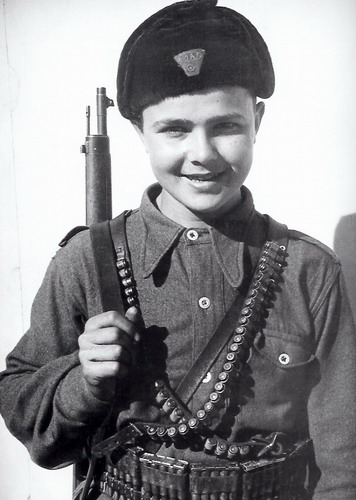 In
March 1948, the communists, who kept records on all the children aged three to fourteen in all the areas they
controlled, take children
from the villages and send them across the northern borders,
supposedly for safety reasons. The perception (probably correct) of many of
the Greeks is that they want to indoctrinate them as future soldiers
much as the Turks did with the young Greek boys who became jannisaries
during the Ottoman
period. More than 25,000 Greek children
are taken to the communist Balkan countries and Eastern Europe.
On November 17, 1948, and again in November 1949 the UN General assembly passes a resolution
condemning the removal of the Greek children, demanding their return. These and all subsequent UN resolutions
are never answered. From 1950 to 1952 only 684 children are permitted to return to Greece. By 1963,
around 4000 children (some of them born in Communist countries) have been
repatriated. Of those who did not return many died of illness, some escaped
to Germany and others have since returned or have yet to return.
The kidnapping of the children is a bad move
by the communists because from that point on they lost any support
they had in the villages. It must be pointed out that the Yugoslavians provided nearly 10,000 volunteers recruited from their own army,
and had the communists eventually been successful in winning the
war, some territories in Northern Greece would have been handed
over to their neighbors in the north. In the eyes of the Greek government
and their new ally this would have been just the first step.
The war went beyond the fear of having a leftist
government running Greece. This was a fear that the country of Greece would
cease to exist, becoming a part of an ever expanding communist world
with its capital in Moscow. In
March 1948, the communists, who kept records on all the children aged three to fourteen in all the areas they
controlled, take children
from the villages and send them across the northern borders,
supposedly for safety reasons. The perception (probably correct) of many of
the Greeks is that they want to indoctrinate them as future soldiers
much as the Turks did with the young Greek boys who became jannisaries
during the Ottoman
period. More than 25,000 Greek children
are taken to the communist Balkan countries and Eastern Europe.
On November 17, 1948, and again in November 1949 the UN General assembly passes a resolution
condemning the removal of the Greek children, demanding their return. These and all subsequent UN resolutions
are never answered. From 1950 to 1952 only 684 children are permitted to return to Greece. By 1963,
around 4000 children (some of them born in Communist countries) have been
repatriated. Of those who did not return many died of illness, some escaped
to Germany and others have since returned or have yet to return.
The kidnapping of the children is a bad move
by the communists because from that point on they lost any support
they had in the villages. It must be pointed out that the Yugoslavians provided nearly 10,000 volunteers recruited from their own army,
and had the communists eventually been successful in winning the
war, some territories in Northern Greece would have been handed
over to their neighbors in the north. In the eyes of the Greek government
and their new ally this would have been just the first step.
The war went beyond the fear of having a leftist
government running Greece. This was a fear that the country of Greece would
cease to exist, becoming a part of an ever expanding communist world
with its capital in Moscow.
|
|
 On
May 16, 1948 the body of CBS News correspondent George Polk is found in the
harbor of Thessaloniki several days after he'd left his hotel for an interview with
Markos Vafiades of ELAS. This becomes an international news story, some
say the equivalent of the Dreyfus affair (or the Lambrakis murder
in the same city 15 years later). In the trial, another
journalist, Gregory Staktopoulos is convicted of being an accomplice
along with several guerilla leaders, (two of whom may have
already been dead before the murder took place). Staktopoulos who had worked for a local Greek Communist daily published clandestinely during the
German occupation, was believed to have been the scapegoat and many theories
circulate that Polk was killed by the Americans, British Intelligence,
the Greek ultra-right, the communists or take your pick. Polk's
articles had been very critical of the Truman Doctrine and
the Greek Government. He had uncovered a scandal involving leading
Royalist and Greek Foreign Minister Constantine Tsaldaris which
could have brought down the government. On
May 16, 1948 the body of CBS News correspondent George Polk is found in the
harbor of Thessaloniki several days after he'd left his hotel for an interview with
Markos Vafiades of ELAS. This becomes an international news story, some
say the equivalent of the Dreyfus affair (or the Lambrakis murder
in the same city 15 years later). In the trial, another
journalist, Gregory Staktopoulos is convicted of being an accomplice
along with several guerilla leaders, (two of whom may have
already been dead before the murder took place). Staktopoulos who had worked for a local Greek Communist daily published clandestinely during the
German occupation, was believed to have been the scapegoat and many theories
circulate that Polk was killed by the Americans, British Intelligence,
the Greek ultra-right, the communists or take your pick. Polk's
articles had been very critical of the Truman Doctrine and
the Greek Government. He had uncovered a scandal involving leading
Royalist and Greek Foreign Minister Constantine Tsaldaris which
could have brought down the government.
|
|
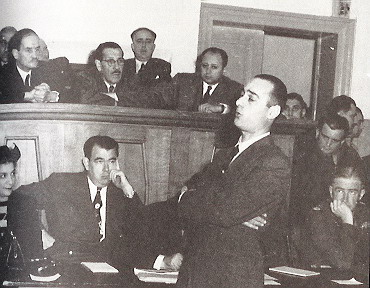 Whoever killed Polk it was obvious to people
that the communists are the scapegoats and unlikely perpetrators.
When the New York Newspaper Guild attempts to send an independent team of journalists to Greece to
investigate Polk's death they are pre-empted by a committee of
prestigious media representatives, headed by Washington columnist Walter
Lippmann. The Lippmann Committee refuses to back an independent inquiry,
working with the State Department in monitoring the Greek
government's investigation and appointing General William (Wild Bill)
Donovan, the wartime head of the Office of Strategic Services (OSS), as their
counsel. Under pressure by the Americans to make an arrest Staktopoulos
is picked up and tortured until he names the killers as two
high-ranking communists on orders from the Kremlin and 'admits'
his role was to set-up Polk. Unlikely story, but the Greek and International
press bought it and that was the end of it. Except that Staktopoulos
declares his innocence until he dies in 1988. In January
2004 his widow, Theodora Zisimopoulou-Staktopoulouís appeal for
a posthumous retrial based on claims that
new evidence proves his innocence, is rejected by the Supreme Court
of Greece. Clearly if the US and Greek governments were not involved
in the murder their investigators had failed to ask the most important
question when one wants to solve any crime; Motive. Who had the stronger motive
for wanting Polk dead? The communists? Why? Was the interview with
Markos so bad? On the other hand the Greek government might
go to great lengths to avoid being exposed as corrupt or in the
pocket of the US. And as for the Americans, one life is cheap to protect the world from
communism. Whoever killed Polk it was obvious to people
that the communists are the scapegoats and unlikely perpetrators.
When the New York Newspaper Guild attempts to send an independent team of journalists to Greece to
investigate Polk's death they are pre-empted by a committee of
prestigious media representatives, headed by Washington columnist Walter
Lippmann. The Lippmann Committee refuses to back an independent inquiry,
working with the State Department in monitoring the Greek
government's investigation and appointing General William (Wild Bill)
Donovan, the wartime head of the Office of Strategic Services (OSS), as their
counsel. Under pressure by the Americans to make an arrest Staktopoulos
is picked up and tortured until he names the killers as two
high-ranking communists on orders from the Kremlin and 'admits'
his role was to set-up Polk. Unlikely story, but the Greek and International
press bought it and that was the end of it. Except that Staktopoulos
declares his innocence until he dies in 1988. In January
2004 his widow, Theodora Zisimopoulou-Staktopoulouís appeal for
a posthumous retrial based on claims that
new evidence proves his innocence, is rejected by the Supreme Court
of Greece. Clearly if the US and Greek governments were not involved
in the murder their investigators had failed to ask the most important
question when one wants to solve any crime; Motive. Who had the stronger motive
for wanting Polk dead? The communists? Why? Was the interview with
Markos so bad? On the other hand the Greek government might
go to great lengths to avoid being exposed as corrupt or in the
pocket of the US. And as for the Americans, one life is cheap to protect the world from
communism.
|
|
In January of 1949 Markos and his strategy of
guerilla warfare are replaced by Nikos
Zakhariades. He believes in more
conventional warfare, but by now the Greek Armed forces are better equipped by the Americans who have introduced a new weapon to finish off the war. It is called Napalm B. The Greek Army is led by General Alexander Papagos,
the hero of the 1940 triumph over the Italians. Zakhariades
decision to fight conventionally is another bad one and one has
to wonder how this guy had any followers whatsoever. But this
decision is not as critical
a
mistake as siding with Moscow in its dispute with Tito and Yugoslavia. Everything
from weapons to food had been coming across the border from communist Bulgaria,
Yugoslavia and Albania. When
Yugoslavia closes its borders and cuts off the essential supply
of weapons, followed by Albania a few months, later the communist
position is hopeless and Stalin tells them so. The new-improved
Greek armed forces begins an offensive in the summer of 1949, code-named Operation TORCH. Papagos attacks the
last communist strongholds in northern Greece with more than 50,000 men, driving them across the border into Albania and
Bulgaria.
|
|
 The Civil war is another catastrophe for Greece, for
many
worse than the occupation. More people are killed during
the Civil war than during the occupation. The village populations
fall as people move to the cities, some for safety reasons
and others because they are forced to by the government who believe
that the fewer people in the villages, the less support the rebels
will have. This creates tremendous pressure on the government to
feed these refugees from the countryside who have filled the cities
and towns, many who never return to the villages. In the end the communists
realise their struggle is over, for now. Some are
executed as traitors. Many are sent to the
prison island of Makronissos
for re-programming.
Others escape across the border to Yugoslavia and Eastern Europe, never
to return again. It is easy to have sympathy for someone who has fought
to liberate Greece and is then declared an enemy of the state, hunted down,
tortured and made to confess to treason, and then executed or exiled. A large
number of the communist fighters were young and naive, and though hardened
by war still had a dream of a new, more democratic society.
But the executions, torture and reprisals that took place on both
sides are enough to turn sympathy into a simmering hatred of
an enemy that at one time was a fellow countryman. This kind of hatred can continue for generations. The Civil war is another catastrophe for Greece, for
many
worse than the occupation. More people are killed during
the Civil war than during the occupation. The village populations
fall as people move to the cities, some for safety reasons
and others because they are forced to by the government who believe
that the fewer people in the villages, the less support the rebels
will have. This creates tremendous pressure on the government to
feed these refugees from the countryside who have filled the cities
and towns, many who never return to the villages. In the end the communists
realise their struggle is over, for now. Some are
executed as traitors. Many are sent to the
prison island of Makronissos
for re-programming.
Others escape across the border to Yugoslavia and Eastern Europe, never
to return again. It is easy to have sympathy for someone who has fought
to liberate Greece and is then declared an enemy of the state, hunted down,
tortured and made to confess to treason, and then executed or exiled. A large
number of the communist fighters were young and naive, and though hardened
by war still had a dream of a new, more democratic society.
But the executions, torture and reprisals that took place on both
sides are enough to turn sympathy into a simmering hatred of
an enemy that at one time was a fellow countryman. This kind of hatred can continue for generations.
|
|
 The period
is perhaps the darkest in Greek history. But the world is never as black and white as it seems. The Greek
Civil war was not a clash of good vs evil but one of two extreme
belief systems that could not co-exist, with the majority of
the Greek people trapped somewhere in the middle. It was a battle of ideologies
and while the Greek government can be blamed for seeing the communists
as a bigger problem then the fascists (who were never purged), the
communists by abstaining from the elections chose to give up their
small slice of the pie, which could have grown larger. (The communists did have some
public
support and do so even today.) Rather then play whatever role they could
get in Greek post-war politics and gain power a bit at a time they
chose to go back to the mountains and play the part of resistance
fighters which they had become
comfortable with during the occupation. When
you have two antagonistic groups who both believe they are
right and are willing to fight to the death, there are always those people
who will stand on the sidelines to cheer and supply weapons,
in exchange for an influential role in the society of
the victors. When one side is backed by these forces the only chance
the other has of victory is by being patient and playing the role assigned to them
while taking small steps to bring forth their agenda. The communists
were victims of their inability to adapt to a new situation.
They had the misfortune of being communists at the exact moment
that the US declared war on communism. (Photo on left is the funeral of the victims of the Dekembrianna) The period
is perhaps the darkest in Greek history. But the world is never as black and white as it seems. The Greek
Civil war was not a clash of good vs evil but one of two extreme
belief systems that could not co-exist, with the majority of
the Greek people trapped somewhere in the middle. It was a battle of ideologies
and while the Greek government can be blamed for seeing the communists
as a bigger problem then the fascists (who were never purged), the
communists by abstaining from the elections chose to give up their
small slice of the pie, which could have grown larger. (The communists did have some
public
support and do so even today.) Rather then play whatever role they could
get in Greek post-war politics and gain power a bit at a time they
chose to go back to the mountains and play the part of resistance
fighters which they had become
comfortable with during the occupation. When
you have two antagonistic groups who both believe they are
right and are willing to fight to the death, there are always those people
who will stand on the sidelines to cheer and supply weapons,
in exchange for an influential role in the society of
the victors. When one side is backed by these forces the only chance
the other has of victory is by being patient and playing the role assigned to them
while taking small steps to bring forth their agenda. The communists
were victims of their inability to adapt to a new situation.
They had the misfortune of being communists at the exact moment
that the US declared war on communism. (Photo on left is the funeral of the victims of the Dekembrianna)
|
|
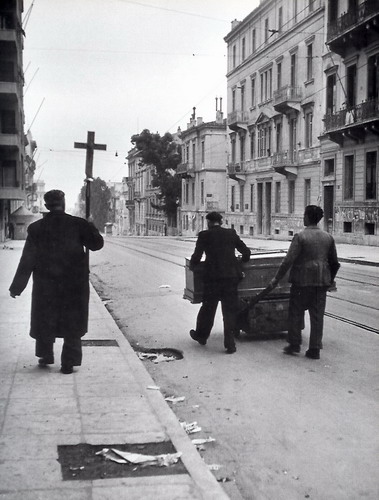 The sense of hopelessness
in Greece triggers a mass exodus of young people looking
for a better life in Australia, the USA and Canada. Starting from
the bottom and building new lives in the new world, some open restaurants and
other small businesses in what can be viewed as yet another
wave of Hellenization as Greek communities increase in New
York, Chicago, Detroit, Melbourne and other towns and cities. Many
send money
back to support their families in the decimated villages and on the islands.
(See
Greek Immigration Figures) For the next 25 years or so Greece is to be under
the influence of the US government who protect their investment
by injecting lots of money, much of it for the military, into the
country. At the same time the number of Greeks living and finding
success in America creates a bond between the people of both
countries. Without the British and the Americans it is likely Greece
would have become a communist country. Where it would have gone
from there, nobody can say for certain. But while the rest of war-torn Europe was
rebuilding, Greece was fighting a war with itself and is several years behind.
With the communist threat now over it is up to the Americans to
try to help the Greeks rebuild their country from the ground
up. Whatever lies behind America's interest it is a partnership
that Greece has no choice but to accept. The glories
and heroism of the Greeks that had inspired the world during Second
World War are nearly forgotten. What is not forgotten are the scars of
this period in Greek history, which will last through the rest of the
century, and the contradiction of a free US-protected Greece
with concentration camps that are just as horrific and brutal
as those during the Nazi occupation. The sense of hopelessness
in Greece triggers a mass exodus of young people looking
for a better life in Australia, the USA and Canada. Starting from
the bottom and building new lives in the new world, some open restaurants and
other small businesses in what can be viewed as yet another
wave of Hellenization as Greek communities increase in New
York, Chicago, Detroit, Melbourne and other towns and cities. Many
send money
back to support their families in the decimated villages and on the islands.
(See
Greek Immigration Figures) For the next 25 years or so Greece is to be under
the influence of the US government who protect their investment
by injecting lots of money, much of it for the military, into the
country. At the same time the number of Greeks living and finding
success in America creates a bond between the people of both
countries. Without the British and the Americans it is likely Greece
would have become a communist country. Where it would have gone
from there, nobody can say for certain. But while the rest of war-torn Europe was
rebuilding, Greece was fighting a war with itself and is several years behind.
With the communist threat now over it is up to the Americans to
try to help the Greeks rebuild their country from the ground
up. Whatever lies behind America's interest it is a partnership
that Greece has no choice but to accept. The glories
and heroism of the Greeks that had inspired the world during Second
World War are nearly forgotten. What is not forgotten are the scars of
this period in Greek history, which will last through the rest of the
century, and the contradiction of a free US-protected Greece
with concentration camps that are just as horrific and brutal
as those during the Nazi occupation.
For more on post-war Greece and the Civil war I recommend this very interesting video called Greece: The Hidden War. This is a British political documentary produced in 1986 and shown for just one and only time in British television, before being banned.
|
|
















